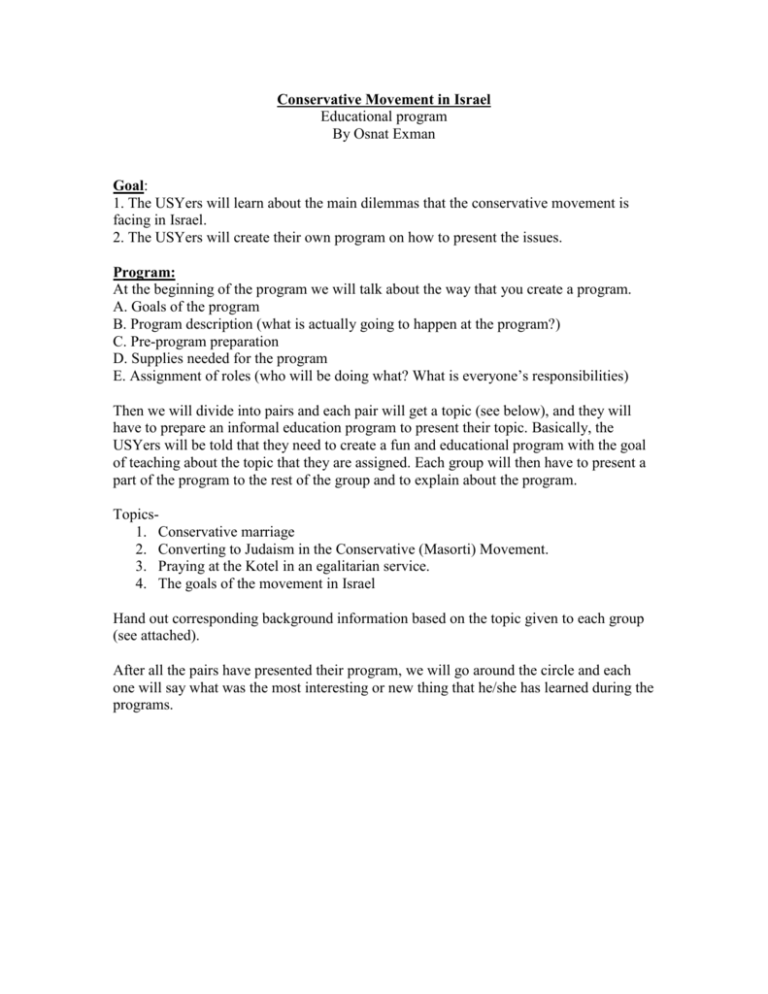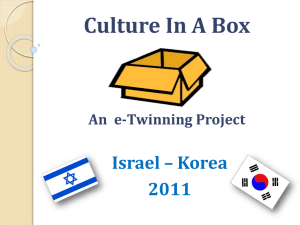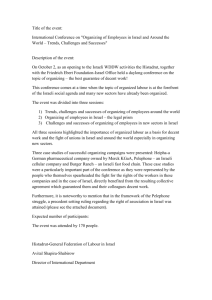
Conservative Movement in Israel
Educational program
By Osnat Exman
Goal:
1. The USYers will learn about the main dilemmas that the conservative movement is
facing in Israel.
2. The USYers will create their own program on how to present the issues.
Program:
At the beginning of the program we will talk about the way that you create a program.
A. Goals of the program
B. Program description (what is actually going to happen at the program?)
C. Pre-program preparation
D. Supplies needed for the program
E. Assignment of roles (who will be doing what? What is everyone’s responsibilities)
Then we will divide into pairs and each pair will get a topic (see below), and they will
have to prepare an informal education program to present their topic. Basically, the
USYers will be told that they need to create a fun and educational program with the goal
of teaching about the topic that they are assigned. Each group will then have to present a
part of the program to the rest of the group and to explain about the program.
Topics1. Conservative marriage
2. Converting to Judaism in the Conservative (Masorti) Movement.
3. Praying at the Kotel in an egalitarian service.
4. The goals of the movement in Israel
Hand out corresponding background information based on the topic given to each group
(see attached).
After all the pairs have presented their program, we will go around the circle and each
one will say what was the most interesting or new thing that he/she has learned during the
programs.
Converting to Judaism in the Conservative (Masorti) Movement:
MERCAZ Newsletter — Spring 2006
COURT AGAIN TO RULE: WHO IS A JEW? WHO IS A RABBI?
The Masorti Movement has joined the Reform Movement in one important suit before the
Israeli High Court of Justice and is providing nuanced support in a second case concerning
the rights of non-Orthodox Jews in Israel.
The first case asks the Court to rule that non-Jewish temporary residents, such as tourists
and diplomats, who undergo Reform or Conservative conversion in Israel be recognized as
Jews with the full benefits of Israeli citizenship under the Law of Return. At present, only
Orthodox converts to Judaism in Israel are recognized under the Law of Return with the right
to immediate citizenship.
The new conversion case follows the Court’s previous rulings on the subject, including the
1989 decision that applied the Law of Return to all conversions performed in the Diaspora as
well as the early 2005 ruling that extended the Law’s jurisdiction to include non-Orthodox
converts who study in Israel but whose conversion ceremony is held outside of the country.
The joint Reform-Conservative petition argues that the High Court’s consistent stand on the
question throughout the years leads to the conclusion that the term “converted” in the
definition of “Who is a Jew” in the Law of Return includes non-Orthodox conversions
performed both abroad and in Israel. Furthermore, state the petitioners, the Knesset has
failed to produce legislation that would grant the Chief Rabbinate sole jurisdiction to perform
conversions in Israel, as it has with marriage and divorce. In the absence of such a law,
there are no grounds to differentiate among conversions performed in Israel for the purposes
of awarding Israeli citizenship under the Law of Return.
In the second suit, the High Court has been asked to require the Israeli government to
appoint a Reform rabbi as the official spiritual leader of the Reform congregation Birkat
Shalom at Kibbutz Gezer. Should the Court rule on behalf of the petitioner, Rabbi Miri Gold,
it would mark the first time that a non-Orthodox rabbi, and a female rabbi as well, would be
appointed as a state-employed and salaried religious official serving the spiritual needs of an
Israeli religious congregation.
At present, hundreds of rabbis are employed by the state to serve Orthodox communities
throughout the country. “This situation constitutes gross discrimination aimed at a portion of
the public that wants liberal religious Jewish services,” note the petitioners. “It constitutes
unacceptable and illegal preferential treatment for the Orthodox stream and against rabbis
belonging to the liberal streams, as well as against female rabbis who are discriminated
against not only because they are not Orthodox but because they are women.”
Commenting on behalf of the Masorti Movement, Rabbi Peretz Rodman, President of the
Rabbinical Assembly-Israel Region, has written: “As long as the Israeli government is in the
business of providing direct funding for local and regional rabbinic salaries, then nonOrthodox rabbis should be a part of that system. But, it is the abolition of that system that
[the Masorti Movement] is really after, not the inclusion of our people.”
“We don’t advocate direct government funding of rabbinic positions, which makes rabbis
answerable to the government that pays them. Rabbis, we feel, should be responsible to
their constituencies, to the communities they serve. The government of the State of Israel
has an interest in the promotion of Jewish culture of all sorts, and registered, regulated
nonprofits, including synagogues and religious movements of all sorts, should be able to
seek government funding for their activities, including the employment of rabbis who serve
them.” n
155 Fifth Avenue, New York, NY 10010
212-533-7800 x 2016 / fax 212-533-2601
email: info@mercazusa.org
©2006 Mercaz USA. All rights reserved
Praying at the Kotel in an Egalitarian Service:
A WALL FOR ALL
by Shahar Ilan, Haaretz, Feb. 22, 2005
For the last six months, two Western Wall plazas have been operating. At the
old one, men and women are separated, comments are made about the way
you dress and you are watched for the way you behave. In other words,
people who are not ultra-Orthodox or Orthodox national-religious are made
to feel like second class Jews and not wanted there.
The second, new site, the alternative wall plaza at the southern end of the
wall underneath Robinson's Arch, has in effect been turned into Conservative
Judaism's wall.
Many dozens of groups visit, and according to Rabbi Ehud Bendel, president
of the Conservative Movement in Israel, they are very pleased. The services
are mixed, women wear tallitot, kippot, lay tefillin and read from the Torah and nobody responds violently.
The location of the new plaza - amid the piles of stones that some believe
are from the original Temple - and the quiet that prevails there, grants the
place a real spirituality, says Bendel, making prayers there special.
But the Women of the Wall and the Reform Movement reject the new plaza
on the grounds it is not the real Wall. It is a little strange that two such
revolutionary movements are so insistent on sanctifying the traditional
precisely on the issue at which section of the Western Wall they will pray.
The debate seems taken straight from the world of advertising, which should
come as no surprise since religions always depend on marketing. The
argument is that the old Wall is identified with the brand "The Wall," and with
it 2,000 years of longing.
Is it really 2,000 years? Until 1967, the "plaza" consisted of a narrow
courtyard. The Jewish world very quickly grew accustomed to the huge plaza
big enough for several tennis courts.
The alternative plaza solution is not as ridiculous as its opponents claim. It is
the same wall, the same stones. Yes, there's room at the new wall for notes
to God, and couples can even put a note in together.
Most of the affiliated Jewish world is made up of Reform and Conservative
Jews. If those two movements decide that the Robinson's Arch wall is their
wall and the focus of their identity, if the new wall is the one that appears in
their postcards, books and most important, Web sites, then within a few
decades the new Wall will become the magnet of longing for most of the
Jewish people.
Meanwhile, there are quite a few bureaucratic hassles in the matter of
operating the plaza. One of the main problems is the state's preference to
operate the site as an archaeological garden. Worshipers who arrive during
the garden's operating hours have to pay an entrance fee. On Friday
evenings Conservatives are not allowed to pray there because the garden is
closed.
The state, particularly the Antiquities Authority, must understand that just as
they gave up their control over the old Wall, since it is a place of prayer, and
even though it is one of the most important archaeological sites in the world,
they will also have to give up the control over the new plaza.
A separation must be made between the Herodian-era street that serves as
the place of prayer - or at least a large part of it does - and the
archaeological garden, and a separate entrance should be created for the
place of prayer.
The Antiquities Authority, which in recent years has been ready for farreaching compromises with the ultra-Orthodox, will have to swallow its pride
in this matter for the sake of peace with the progressive movements. If that
means it will have to return the money to the donor who financed the
archaeological garden, the progressive movements can pay for that.
The Reform Movement, the Women of the Wall, and the secular public must
leave the old Wall to the fanatics, and all those who are ready to accept it
should admit that that section of the Wall has ceased being a national site,
and has become a shtieble - a small, local synagogue.
The progressive groups that are interested in the Wall should create a joint
representative body that demands the state give them the authority to run
the new plaza and pass a law allowing them to do so as they see fit. Just like
the old Wall has been given over to the ultra-Orthodox.
The progressive groups have enough power to impose this on the state.
Presumably, within a short time, some of the nationalist religious will find out
they prefer the open, mixed atmosphere at the new wall over the hostility
and messianism at the old one. Those who prefer the old Wall, deserve it.
Conservative marriage:
Masorti rabbis offer couples the
option of holding a spiritual,
egalitarian and pluralistic wedding
ceremony, rooted in tradition yet
responsive to modern life. Many
young couples in Israel are
disillusioned by the religious
coercion of the Orthodox
establishment and decide to marry
in civil ceremonies abroad. The
Masorti Movement’s open and
inclusive approach brings hundreds of young Jews back to the fold each year.
The Orthodox establishment has a stranglehold on Jewish religious affairs in
Israel, with Israeli law stipulating that only competent religious leaders (Jewish,
Muslim, Christian and Druze) can perform marriages. Masorti weddings are not
recognized by the State, therefore, couples married by a Masorti rabbi must
travel abroad for an additional civil ceremony, if they wish their marriage to be
officially recognized.
Contact Information
Director: Rabbi Andrew Sacks
Address: POB 7559, Jerusalem 91074 ISRAEL
Phone: +972 (2) 624 6510 ext 30
Fax: +972 (2) 624 6869
Email: raisrael@masorti.org
The Goals of the Conservative (Masorti) Movement in Israel:
The Masorti Movement is the umbrella organization comprising institutions and
individuals affiliated with Masorti (Conservative) Judaism in Israel.
The Masorti Movement seeks to advance and reinforce a spiritual-religious,
communal and family life-approach, combining commitment to Judaism, Zionism
and democracy, which will constitute a leading force in society, contributing to
Klal Yisrael. The following are the goals of the movement:
1
Develop existing Masorti congregations and establish new
congregations and havurot throughout Israel, encourage Masorti
settlement of the land and create additional frameworks for
affiliation and activity.
2
Establish educational frameworks for children, youth and adults, in
the spirit of the principles of the Movement.
3
Provide religious services, under the leadership of the Rabbinical
Assembly, for Masorti congregations and the general Israeli public.
4
5
6
7
8
9
Public, political and legal activities to promote religious pluralism in
Israel, official establishment recognition of the Movement, its
congregations and its rabbis, and the implementation of the rights
ensuing from such recognition.
Increase public awareness of the Movement.
Cultivate and train rabbis and lay leaders to spiritually lead the
Movement, both locally and nationally.
Cultivate volunteers for social causes within Israeli society, such as:
assistance to the needy, reduction of social gaps, advancement of
equality between all citizens of the State and between the genders,
mending of societal schisms and immigrant absorption.
Ongoing clarification of ideological positions and formulation of an
ideological-religious path for Masorti Judaism attentive to the Israeli
reality.
Strengthen ties between the Movement and its affiliates.
10
Encourage aliya and strengthen ties with Jewish communities
abroad.









